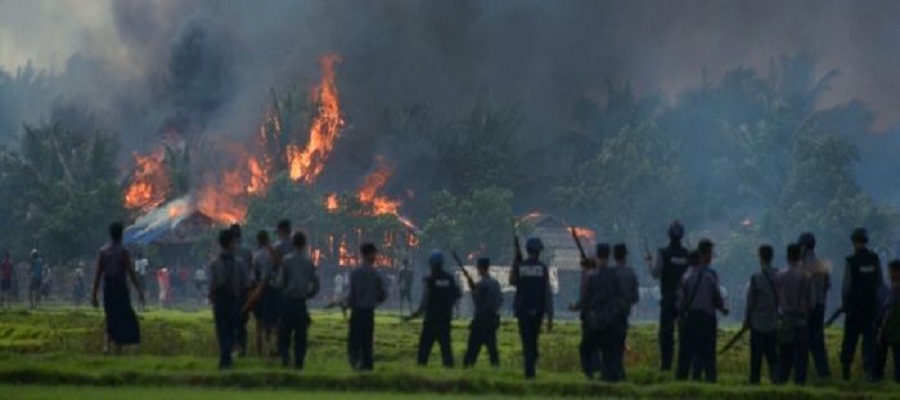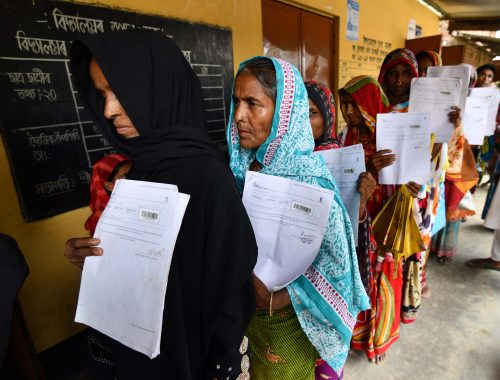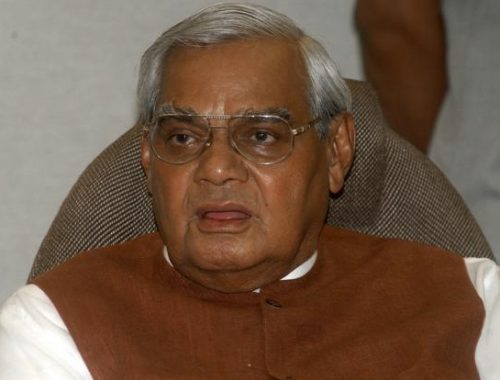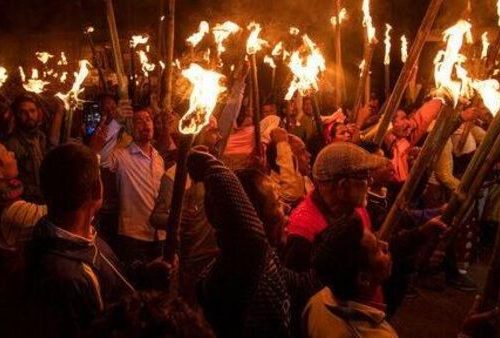Half a world away from the elegant confines of the International Court of Justice in The Hague, where Myanmar is being accused of genocide in a landmark case that opened this week, a Rohingya Muslim man was preparing to die.
It was, he said by phone on Thursday, going to be a slow demise. His village in Rakhine State in far western Myanmar had been attacked in recent weeks. The rice had been ready to harvest, but Buddhists had stolen the crop. Aid from international groups had ceased. People were hungry, sick and desperate.
“I have a home and a rice field, but I am just waiting to die,” said the man, who did not want his name used because he feared he would be killed for speaking out.
This week’s dramatic opening in The Hague saw agonizing testimony about the mass slaughter and rape of Rohingya Muslims by Myanmar’s military and local mobs, followed by strenuous denials from Daw Aung San Suu Kyi, the Nobel Peace Prize laureate who is Myanmar’s de facto civilian leader, that there had been any orchestrated persecution of the Muslim minority.
But the three days of hearings, which ended on Thursday, had a narrower objective than deciding whether Myanmar’s treatment of the mostly stateless minority group constitutes the gravest of international crimes. A determination of whether Myanmar, a mostly Buddhist country, is guilty of acting with genocidal intent could take years to make.
The point of this week’s legal proceedings, instead, was to determine whether judges need to issue an emergency order to protect the Rohingya still in Myanmar from what United Nations investigators say is an ongoing genocidal campaign. The judges said on Thursday that they would issue a decision as soon as possible.
After decades of discrimination, capped by slaughter, rape and wholesale village burnings in 2017 — atrocities that have been well documented by human rights groups and journalists — there are now far more Rohingya living outside of their homeland in Rakhine than inside it.
Over the years, about a million have fled to neighboring Bangladesh, where they live in a series of settlements that constitute the world’s largest refugee camp. Others survived perilous passages by boat to work as migrant workers elsewhere in Southeast Asia. Thousands more toil in Muslim countries like Saudi Arabia.
The roughly half a million Rohingya still in Rakhine survive at the whim of a security state that considers them foreign interlopers. Their tenuous situation has been aggravated in recent months by open warfare between Myanmar’s military and another ethnic group native to the state, the Rakhine.
In testimony presented to the court this week, lawyers for Gambia, the West African country that has brought the case against Myanmar in the International Court of Justice on behalf of other Muslim-majority nations, said that the Rohingya in Rakhine are facing mounting pressure, even the risk of starvation.
“The evidence of Myanmar’s genocidal intentions has actually strengthened over the past year,” said Tafadzwa Pasipanodya, a lawyer on the Gambian team.
Officials in the state, however, said the fact that Muslims still lived in Rakhine proved that crimes against humanity were not unfolding.
“Gambia’s accusation that genocide is going on in Rakhine is nonsense because there are some Muslims still living here peacefully,” said U Win Myint, a spokesman for the Rakhine State government. “If you still can see them in Rakhine State, how can you say there is a genocide?”
Ms. Aung San Suu Kyi has said that her government is committed to welcoming back Rohingya who fled to Bangladesh. But since the Rohingya exodus, the local government has taken over some of their villages, which had been razed by fire, and built security bases and government buildings on the land.
Since outbreaks of sectarian violence in 2012, Rohingya living in and around Sittwe, the capital of Rakhine, have been confined to internment camps. Sittwe’s grandest mosques have fallen into disrepair. Others were reduced to rubble.
Fatima Khatun, a 30-year-old Rohingya who graduated from what was once a religiously mixed high school in Sittwe, said her husband had died this year of what should have been an easily treatable case of kidney stones.
“We couldn’t get him to the hospital in time,” she said, sitting in her wooden shack in an internment camp on Sittwe’s outskirts. “Now my family has nothing.”
Late last month, 95 Rohingya, including 23 children, boarded a boat to try to escape the country, only to be caught by the authorities as their vessel rounded the bulk of the Myanmar landmass for the Andaman Sea. They are now in prison, charged with illegal movement, according to a rights group, Fortify Rights.
Because most Rohingya lack citizenship in their homeland, they are not allowed to travel freely inside Myanmar.
At the International Court of Justice on Wednesday, Ms. Aung San Suu Kyi disputed the notion that the military, with whom her government now shares power, had planned a genocide of the Rohingya.
She accused the Gambian team of painting “an incomplete and misleading factual picture” of what happened in Rakhine and insisted authorities in Myanmar were trying to help the Muslim group.
Scholarships would be made available to Muslim students, she said, even though almost no Rohingya have had access to higher education for years.
Ms. Aung San Suu Kyi also said on Wednesday that Myanmar could depend on its own justice system to prosecute any crimes that might have occurred in Rakhine, obviating the need for an international court to get involved.
Ms. Aung San Suu Kyi pointed to a guilty verdict in which a military tribunal convicted seven soldiers for their roles in the killing of 10 Rohingya in the village of Inn Din in Rakhine in 2017. Details of that massacre were uncovered by two Reuters reporters of Myanmar nationality, who spent more than 16 months in jail for their exposé.
U Aung Than Wai, a politician from the ethnic Rakhine minority, which is embroiled in its own insurgency with the state of Myanmar, was in jail with the seven soldiers back when he was a political prisoner. The military men were given premium cigarettes by their jailers, he said, and beer, too.
In November 2018, less than a year into the soldiers’ 10-year sentences, Mr. Aung Than Wai looked at a notice board of inmates who would be released in the coming week and saw the soldiers’ names listed, he said.
“I was shocked that they killed innocent people in cold blood and they were being released early,” he said. “I knew then that there was no rule of law in Myanmar.”
Hannah Beech reported from Bangkok and Saw Nang from Mandalay, Myanmar. Marlise Simons contributed reporting from The Hague.




